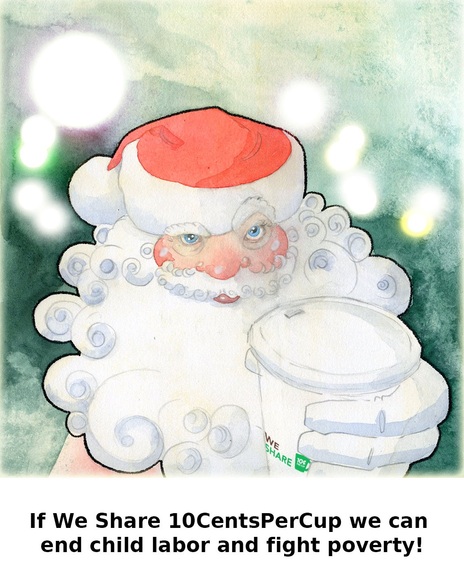Sharing with farmers and farm workers less than 1 cent per cup of coffee, tea and cacao is greedy. It is NOT FAIR to them. It hurts poor children!
In this holiday season most of you think of sharing with your family and giving presents to your children and loved ones while perhaps enjoying a warm beverage with them but very few of you will be aware of the sad reality of the children in the communities that produce that beverage, the coffee, tea and cocoa you drink. Most of these children will receive neither gifts nor food from Santa Claus, because the truth is Santa Claus was not created for them, and because we the consumers, who play Santa Claus, are indifferent towards, or unaware of, their daily struggle. There are more than 100 million of these kids, mostly living in poverty, tens of millions in extreme poverty, due partly to our indifference, but mainly because of the cruel business model of the multinational companies in those industries that we support daily with our customer loyalty and purchasing power.
From the profits they make with the coffee, tea and cocoa that you drink every day, these companies share less than one cent per cup in net benefits with the producers and even less with farm workers. On the other hand they accumulate tens of billions of dollars in profits per year, some of which ends up in Swiss bank accounts, or in Luxembourg, or benefits rich investors in Wall Street. This is in great part why tens of millions of the children of these farmers and farm workers live in extreme poverty; they have no homework to do, because there are no schools in their communities, and they, like their parents, eat barely enough and are malnourished. Many of them work, breaking local laws that prohibit child labor and also violating the Convention of the Rights of the Child. This is a consequence of our sharing net benefits less than one cent per cup of the coffee, tea and chocolate we drink with the communities that produce it for us.
Major coffee, tea and cocoa companies and traders buy as low as they can and sell as high as they can. Many of these same companies pride themselves on being fair, sustainable and ethical, with the complicity of hundreds of NGOs, of the governments and politicians of developed nations, of multilateral organizations, including the UN, so-called "ethical" "certification" labels and even the churches who benefit from these businesses. The truth however is that what they dare to call "ethical" or "Fairtrade" in coffee, tea and chocolate perpetuates poverty; it provides an insignificant benefit of less than 4 cents per day, per person, to the poor people in these rural communities. Sadly, "Fairtrade" is not fair, and was not designed to be fair.

Next time you see the marketing of the "Spirit of Christmas" in Starbucks, McDonald's, Dunkin Doughnuts, Tim Hortons, Costa Coffee, Burger King, the Marriott, Hilton, Hyatt or almost any coffee shops, hotels or restaurants, or drink a Nespresso, Nescafe, Dolce Gusto, Keurig, Senseo, Illy, Lavazza, Folgers, Maxwell House, etc. at your home or office, you can be almost certain that they all share less than one cent per cup in net benefits of what you pay them with the families who produced the coffee they sell to you. You can also be certain that according to the US Department of Labor and reports by many independent journalists there is child labor in coffee, tea and cocoa. This is because these are exploitative industries that profit from extreme poverty.
But we hundreds of millions of consumers are not able, through corporations, charity organizations, or development aid, to change their lives radically. A transparent Shared Value system, with compensation of at least 10CentsPerCup of coffee, tea and cocoa (chocolate) consumed in developed countries, can change the world for more than 100 million children, and in total for 400 million people, in the rural communities that produce the raw materials for these drinks that are so enjoyed by the rest of the world. This is why I am working to create We Share, a transparent Shared Value system based on compensation from consumers to producing communities.
The World Economic Forum in Davos has undoubtedly, throughout the history of humanity, been the one single organization that has wasted the most its unique and concentrated power to change the world. There the world's most influential entrepreneurs, academics and politicians talk about Improving the State of the World, about Shared Value (At the WEF the CEO of Nestle speaks -in minute 7:50- about Shared Value), but do not practice it toward the hundreds of millions of poor people who supply the WEF Summit, their industries, their universities or their governments. The WEF has never shared 1 cent per cup of coffee to Improve the State of the World.
If Klaus Schwab (78), founder of the WEF, thought at this stage in his life as a social entrepreneur committed to "Changing the World", as a kind of "corporate Santa Klaus" for profit, Schwab could create a WEF Task Force -a PPP- to eradicate the poverty suffered by hundreds of millions of people around the world with a transparent Shared Value system based on compensation paid by the consumers, at no cost to the companies. This would have major and almost immediate benefits for the brands of WEF member companies, finally fulfilling the WEF's promise to Improve the State of the World. That would be almost a miracle because eradication of poverty has never been Schwab's purpose in life or la raison d'être of the WEF.
We must have the courage to tell the truth to our own children: for hundreds of millions of poor children Santa Claus does not exist, they are not part of the "Christmas business model". They have no education, healthcare or good nutrition, mainly because neither the companies nor we the consumers share with their parents even 1 cent as compensation for what they, and some of the kids with their own child labor, produce for us. A similar lack of transparent Shared Value is true in most of what we eat, drink, wear and use that is produced in "developing" or less developed nations.
I hope you will agree with me that, if we share enough with others, if we compensate properly those who produce for us, we can change the world for them. When We Share 10CtsPerCup of coffee, chai and cocoa, or per bar of chocolate, we will be able to tell our children that no one needs to be a Super Hero, or the most influential leader in Davos, to fight social injustice and Improve the State of the World. Millions of us together, sharing a few cents per cup, could invest billions of dollars per year towards ending poverty and creating a rural middle class where currently poverty reigns and hunger is a fact of life.
I look forward to your comments or questions and to your 10CentsPerCup.
